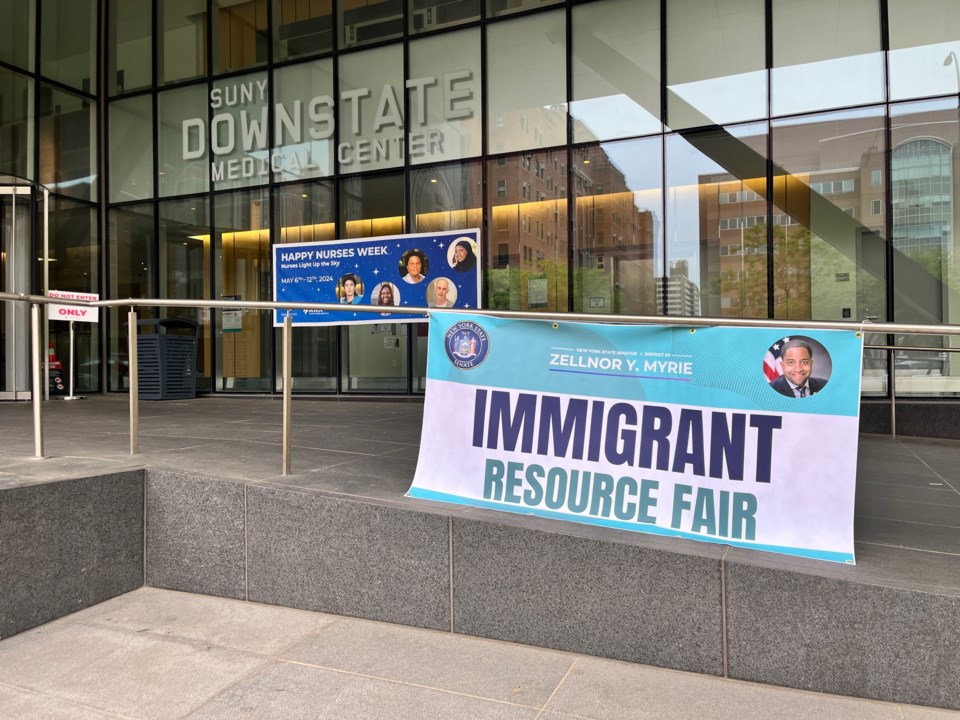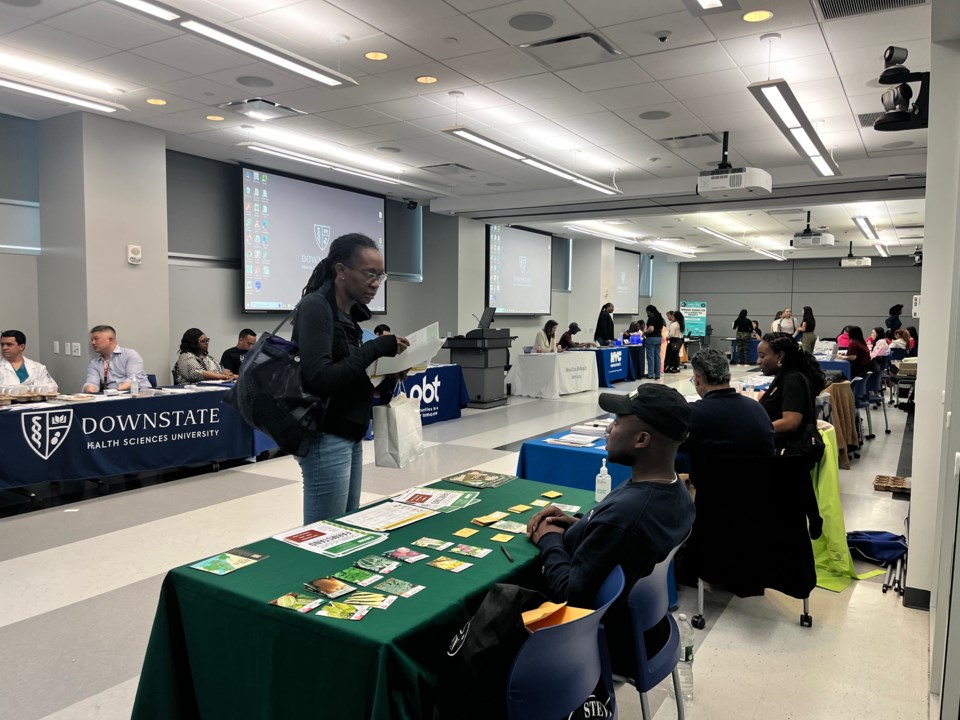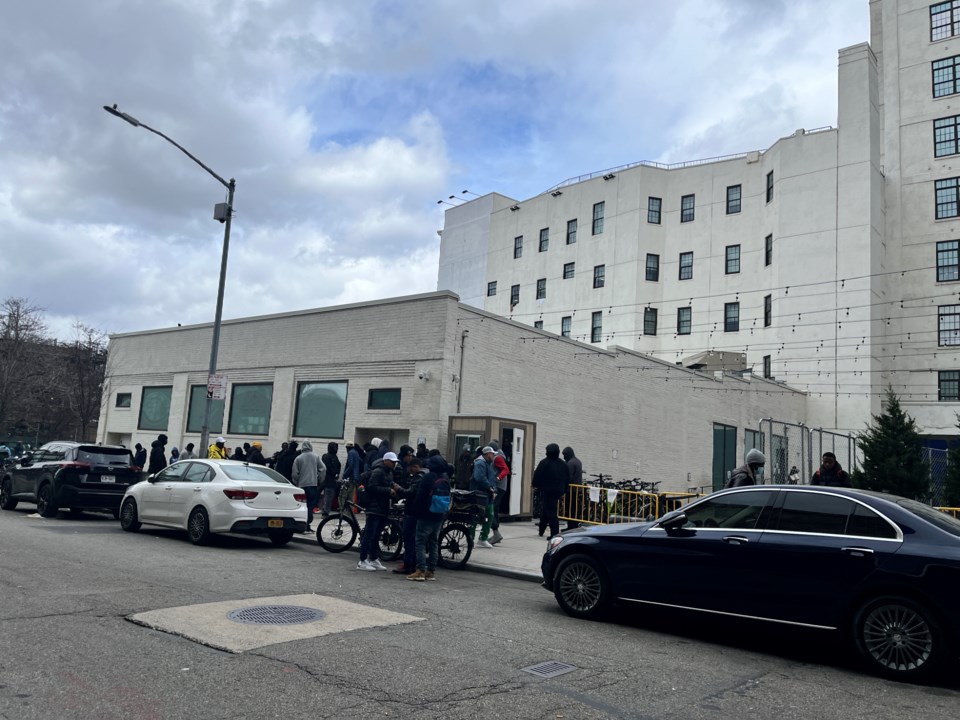New York City this week will start enforcing tighter rules for single adult asylum seekers that want to stay in emergency shelters beyond 30-days, likely resulting in thousands of people becoming homeless in the coming months, a move that many aid organizations and social workers decry as cruel.
About 250 individuals will be pushed out of the city-run emergency shelters this week, according to City Hall.
“This timeline is very inhumane,” said Rosanna Cruz, a senior program director at Good Shepherd Services, a nonprofit organization that runs programs and workshops for New Yorkers, including asylum seekers. “It is an unnecessary form of punishment, as 30-days is not enough time to get yourself situated under any circumstance.”
Single adult asylum seekers that are currently staying in the emergency shelters now must apply for what is known as “reasonable accommodation” to extend their stay, according to a document asylum seekers receive titled “Reminder Of Your Temporary Shelter Exit Date.”
Migrants who can show proof, including letters and photos of “extenuating circumstances" – signing up for English classes, getting a government-issued identification card, and undergoing emergency medical procedures – may be considered for an extension to stay in the shelter beyond the allotted 30-days.
Previously, asylum seekers did not have to show any documentation to reapply for an extension.
“While these changes will require some adaptation, they will help migrants take the next steps in their journeys, reduce the significant strain on our shelter system, and enable us to continue providing essential services to all New Yorkers,” said Camille Joseph-Varlack, chief of staff to Mayor Eric Adams, through a statement.
In an online briefing with reporters on Friday, Joseph-Varlack said about 6,500 migrants have received vacate notices, the Daily News reported. So far 29 migrants have applied for extensions and have been interviewed, of which 14 people were approved extensions and 15 were denied, the news site said.
Cruz said many asylum seekers, about 65,500 who are currently residing in the shelters, are now scrambling to get these documents of proof ready.
“It breaks my heart to see grown men cry as they never expected to be homeless,” she said.
The new shelter rule was agreed to in March between the City and the nonprofit Coalition for the Homeless, which sued the City when Adams said the government should not be required to extend shelter services to adults who entered the country after March 2022.
Stephanie Cordero, director of Immigrants' Rights and Advocacy Projects at Legal Services NYC's Brooklyn office, said how the city will enforce the checklist, and therefore the eviction process, remains unclear.
“Everyone is still trying to get familiar with the terms,” she said.
BLS is now finalizing documentation letters for asylum seekers so they can show up to any “Know Your Rights” workshops or consultation sessions and obtain proof of their efforts.
Hundreds of asylum seekers have come to the workshops Good Shepherd Services have run, and many want legal help to obtain housing and asylum status, Cruz added.
That said, there are outreach issues, according to Cordero.
It is the job of a case manager at the emergency shelter to guide a migrant through this process, but it is unclear how many case managers work at each shelter, what kind of information they are disseminating and to how many people, she said.
In addition, although the city has plenty of Spanish-speaking workers at nonprofits and community-based organizations that help immigrants, there are certainly not enough speakers of West African languages, including Wolof, Bambara, Fulani, Arabic and French.

Some advocates are expecting single adult males from African nations to feel the brunt of the effect from the new rule.
Black male migrants are most likely to get pushed out of emergency shelters, and also get less aid and services than their Hispanic counterparts, according to a recent report from a coalition of migrant aid organizations.
A February survey of 586 migrants found that 93% of single Black adults in emergency shelters received a shelter exit date notice, while 66% of single adults from Latin America received one.
“Everyone is wondering what they can do quickly in 30-days,” said Adama Bah, the executive director of Afrikana, a volunteer group that helps African asylum seekers navigate the shelter system and life in the U.S. “I’ll tell you, it’s not much.”
Bah, who had a table set up at a sparsely-attended immigrant resource fair at SUNY Downstate Medical Center over the weekend, said many African asylum seekers are now heading to mosques and other small religious organizations to find temporary housing in the Bronx and Brooklyn, she said.
Djibril Diouf, an asylum seeker from Senegal who was volunteering at the resource fair for the nonprofit African Bureau for Immigration and Social Services (ABISA), said almost all of his fellow new arrivals are seeking the right to work.
After arriving in New York about a year ago, he said he would like to stay in New York, but would consider moving to Georgia, Michigan or Indiana, if work is available there.
Diouf, who speaks Wolof, French, English and Spanish, said helping fellow asylum seekers navigate the U.S. legal system has sparked his interest in studying social work and the law.
“I will never say no to helping others,” said Diouf, who said he was previously in college studying business management for oil companies.

Most asylum seekers that have talked to a lawyer at BLS ask how they can get a legal representation for immigration court, Cordero said.
“Sadly, our answer is that if you don’t have money, you’ll have to represent yourself,” she said.
All nonprofits can do is to explain to asylum seekers how the court system works, how to prepare for hearings, find interpreters and the limits of seeking asylum status, she said.
“It’s cruel as these people come into the country with no place to live, no money and no food and we’re asking them to figure out how our legal system works right away,” Cordero said.




